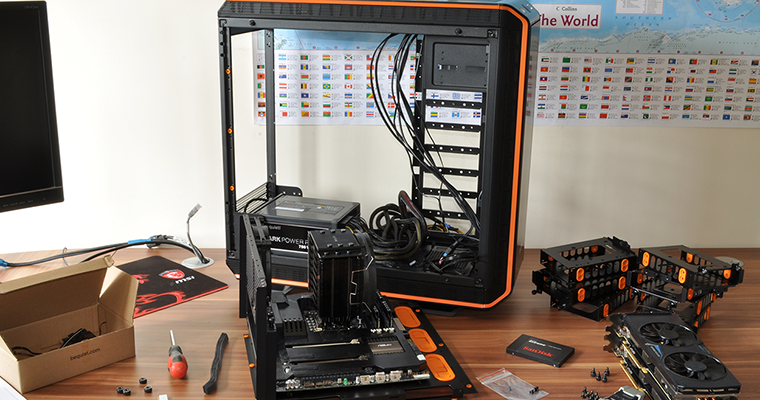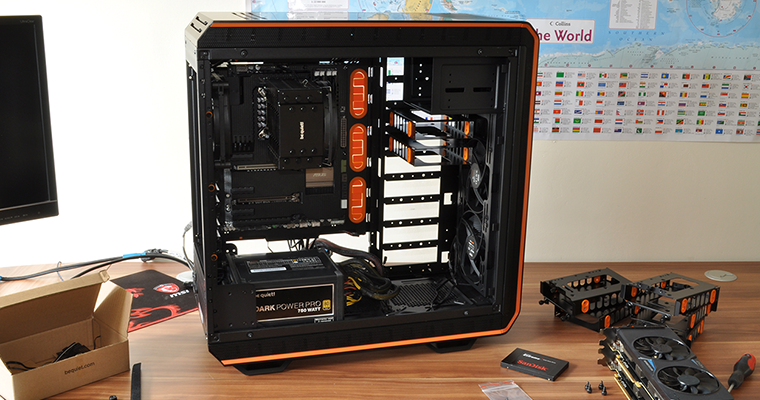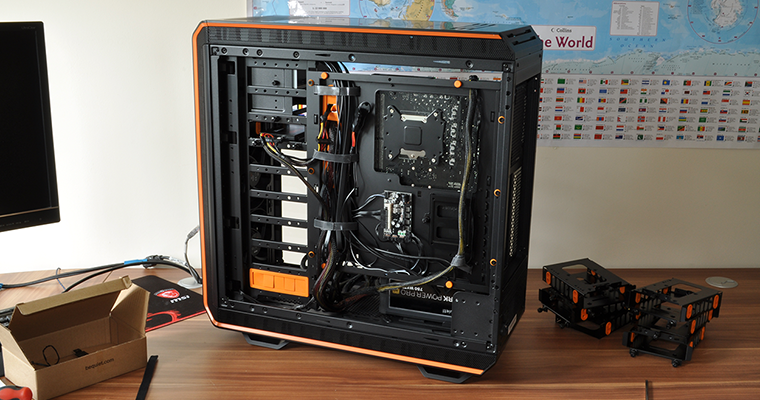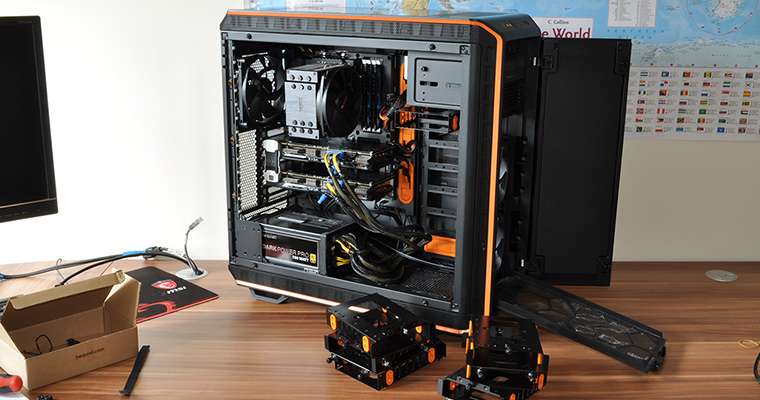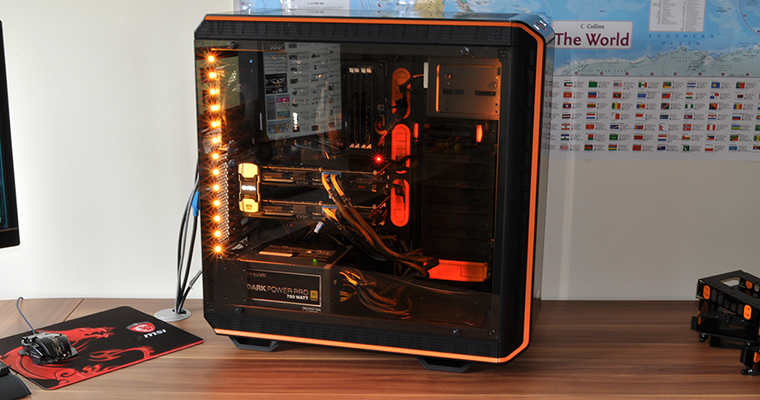Building with Dark Base Pro 900
In many ways, the Dark Base Pro 900 feels like an old-school enclosure. Whereas most modern solutions eschew legacy features in favour of a streamlined and straightforward build, Dark Base retains support for all sorts of hardware while allowing greater freedom in terms of implementation. As a result, building into the case is not as quick nor as easy as you might imagine: it demands extra time and thought, which isn't necessarily a bad thing if you build PCs for fun.
A Dark Base build need only be as complicated as you make it, mind. You could simply throw in your components and call it a day, but that would be doing the case a disservice. The interior is asking to be explored and your natural inclination will be to remove stuff before the hardware goes in. Our build began by removing the seven independent storage bays. Each is made of metal and rigidly held in place by three thumb screws, and rather than spread the seven bays across a couple of cages, be quiet!'s modular implementation allows for superior configurability. Each metal tray can house either a single 3.5in hard disk or two 2.5in SSDs, and there's also a spare 2.5in bracket behind the motherboard.
The next item to come out is the motherboard tray. Removing it entails undoing a series of screws that are easily identified by the orange rubber grommets - there are plenty of these scattered throughout the case to help prevent vibration between the various modular parts. Taking out the tray does simplify motherboard installation somewhat, but shouldn't be considered necessary and, unless you really want to be different, we don't imagine any major advantage in flipping the innards to be quiet!'s proposed inverted layout.
So is the removable motherboard tray merely a gimmick? Not at all. It's always easier to install a motherboard and CPU cooler free from the confines of the case, and the Dark Base Pro 900 has another trick up its sleeve in that the motherboard tray can be reinstalled in higher or lower positions. Want a properly thick top radiator in a push-pull configuration in the roof of the chassis? Not a problem, lower the motherboard tray and you'll open up an 84mm void at the top, albeit at the expense of the two lowest expansion slots.
Plenty of possibilities, though do be aware that having such an array of choices creates a little extra work here or there. The power-supply bay, for example, isn't flush to the back of the chassis as you'd expect. It too is modular to facilitate the optional inverted layout, resulting in an internal passthrough power cable that runs from the back of the case to the PSU bay. Another potential proviso, as you can see above, is that the space above and below the motherboard tray makes it tricky to hide excess cable clutter.
The three rubber-grommeted cable-routing holes on the side of the motherboard tray could be bigger, and it takes a bit of effort to hide the bulk of the cables behind the tray and out of view. The bundled Velcro strips and numerous tie-down points certainly help, though we do view the lack of a dedicated PSU compartment as a missed opportunity. Such an area would have helped enable a tidier finish, and we'd also like to see some form of alternative covers for unused drive-tray mounting points - be quiet! does include one rubber grommet that fits in neatly, yet the other mounting points appear bare and unfinished with drive trays removed.
One of the features unique to this Pro variant is the PWM fan hub attached to the rear of the tray. Home to eight fan headers (4x4-pin, 4x3-pin) and two LED strip connectors, the hub sources its power from a SATA connection and handily has a PWM cable that attaches to a motherboard header for BIOS control of all associated fans. In case you're wondering, the standard Dark Base 900 does include a fan hub, but it's a lesser model with one less fan header, no LED connectors, and no PWM-to-motherboard facility.
A roomy interior helps prevent the case from feeling cramped and ventilation strips across the top, front and bottom suggest that airflow should be plentiful. be quiet!'s designers have concentrated on some of the small things that matter, yet it's a surprise to find that a few items have escaped their attention. The optical bays, for example, aren't tool-free, the bundled screws and accessories aren't well labelled, and if we're being picky, the provided manual is far too basic and doesn't do enough to convey the various options available to the Dark Base Pro 900 interior.
We'd love to be able to hide some of the PSU cables, but that aside, it's a good-looking build with plenty of space for a reservoir or other high-end paraphernalia and be quiet! does include a liquid-cooling bracket as part of the bundle. Somewhat unusually, the rear side panel is equipped with a rectangular section that can be adjusted to allow for airflow or removed for mounting additional fans. Said panel is also notched, rather than hinged, making it slightly more awkward to put back on, and in a similar vein the top panel isn't easy to get off - you need to press a series of clips, some of which aren't easy to reach.
That large sheet of tempered glass is a thing of beauty though, isn't it? Attached via four padded thumb screws, it provides a full view of the build and gives the Dark Base Pro 900 a premium look and feel. Taking it off requires a little extra care compared to a standard steel panel, and having to undo four thumbscrews limits accessibility compared to rivals with quick-release mechanisms, but the trade-off is worthwhile if you're dressing your PC to impress. On that note, be quiet!'s bundled LED strips are a nice finishing touch. The two rigid strips connect to the fan hub and their cables are long enough to illuminate just about any area. Once up and running, hit the LED toggle switch at the front to choose between white, red, green, blue, orange or off.






